- Home
- Peter Benchley
Beast Page 14
Beast Read online
Page 14
Talley took another gulp of his drink and said, “Captain Darling, we liked what you said at the meeting.”
“You were there? Why?”
“In the back of the room. We wanted to see how people are reacting to all this.”
“That’s easy,” Darling said. “They’re scared to death. One step short of panic. They see their world being threatened by something they can’t even understand, much less do anything about.”
“But you’re not … scared, I mean.”
“You heard what I said back there. It’s like anything else big and awful in nature. You leave it alone, it’ll leave you alone.” He thought of Manning’s children, and added, “Generally … as a rule.”
“That doctor back there. St. John … he’s a fool.”
“That’s one way to put it.”
“But there is something I disagree with you on. What’s happening here is not an accident.”
“What is it, then?”
Darling saw Talley glance at Manning, then Talley said, “Tell me, Captain, what do you know about Architeuthis?”
“What I read, what you wrote, other stuff. Not a whole lot.”
“What do you think about it?”
Darling paused. “Whenever I hear talk about monsters,” he said, “I think about Jaws. People forget Jaws was fiction, which is another word for … well, you know, B.S. As soon as that picture came out, every boat captain from here to Long Island and down to South Australia started fantasizing about thirty-and forty-and fifty-foot white sharks. My rule is, when someone tells me about a critter as big as a tractor-trailer truck, I right away cut a third or a half off what he says.”
“Sound,” said Talley, “very sound. But—”
“But,” Darling said, “with this beast, seems to me when you hear stories about him, the smart thing to do is not cut anything off. The smart thing to do is double ‘em.”
“Exactly!” Talley said. His eyes were bright, and he leaned toward Darling, as if pleased to have discovered a kindred spirit. “I told you I’m a malacologist, but my specialty is teuthology … squid … specifically Architeuthis. I’ve spent my life studying them. I’ve used computers, made graphs, dissected tissue, smelled it, tasted it—”
“Tasted it? What’s it taste like?”
“Ammonia.”
“Ever seen a live one?”
“No. Have you?”
“Never,” Darling said. “And I’d like to keep it that way.”
“The more I studied, the more I realized how little anybody knows about the giant squid. Nobody knows how big they grow, how old they get, why they strand sometimes and wash up dead … not even how many species there are: People say three, some say nineteen. It’s a classic example of the old saw: The more you know, the more you realize how little you really know.” Talley stopped, looking embarrassed, and said, “Sorry. I get carried away. I can cut this short if you—”
“Go on,” said Manning. “Captain Darling has to know.”
They’re setting me up, Darling thought: They’re trolling for me, teasing me like I was a hungry marlin.
“I have a theory,” Talley said, “as good as most and better than some. Up to the middle of the last century, nobody quite believed in the existence of Architeuthis, or of any giant squid. The few sightings were dismissed as the rantings of sailors gone mad. All of a sudden in the 1870s there was a rash of sightings and strandings and even attacks on boats, and—”
“I read about them,” Darling said.
“The point is, there were so many witnesses that for the first time people believed them. Then it all stopped again, until the early 1900s, when, for no reason, there were more sightings and strandings. I wondered if there was a pattern, so I collected reports of every sighting and every stranding, and I fed them into the computer with all the data on major weather events, current shifts and so forth, and I told the computer to find some rhyme or reason to it.
“The computer’s answer was that the pattern of sightings and strandings coincided with cyclical fluctuations in branches of the Labrador Current, the big cold-water funnel that sweeps up the whole Atlantic coast. For most of the cycle, Architeuthis is never seen, alive or dead. But in the first few years of the change, for whatever reason—water temperature, food supply, I don’t pretend to know—the beast shows up.”
“How long are the cycles?” Darling asked.
“Thirty years.”
“And the last one began in …” He knew the answer before the words were out of his mouth.
“Nineteen sixty … ran through sixty-two.”
“I see.”
“Yes,” Talley said. “You do see. It’s here because it’s time.” Talley leaned forward, his hands on the table. “But the truth is, I can give you a volume of facts, and document them for you, and not for a second can I tell you why they’re so. Some people think Architeuthis may get trapped in warm-water currents and suffocate for lack of oxygen and die and wash ashore. Other people think it could be cold water that gets him, water less than, say, minus ten degrees centigrade. Nobody knows.”
This man, Darling thought, is in love with giant squid. “Doc,” he said, “this is all very interesting, but it doesn’t say a lick about why the beast is suddenly eating people.”
“But it does!” Talley said, and he leaned farther forward. “Architeuthis is what we call an adventitious feeder. He feeds by accident, he eats whatever’s there. His normal diet—I’ve looked in their stomachs—is sharks, rays, big fish. But he’ll eat anything. Let’s say that cyclical currents are bringing him up from the two-, three-thousand-foot level where he usually stays. And let’s say he’s finding that his usual food sources are gone. You’d know about this, Captain. From what I hear, Bermuda’s almost fished out. And let’s say all he’s finding to eat is—”
There was a sharp snap! that sounded like a rifle shot, and something flew past Darling’s face.
Osborn Manning had been clutching his plastic swizzle stick so hard that it shattered. “Sorry,” he said. “Excuse me.”
“No,” said Talley. “I’m sorry. Lord …”
“Doc,” Darling said after a pause, “there’s one thing you haven’t talked about—Nature’s number one rule, balance. When there get to be too many sea lions, up jump the white sharks to keep ‘em down. When there get to be too many people, up jumps some plague like the Black Death. Seems to me, this critter being around here is saying nature’s out of whack. Why?”
“I have a theory,” Talley said. “Nature’s not out of whack, people have put nature out of whack. There’s only one animal that preys on Architeuthis, and that’s the sperm whale. Man has been killing off the sperm whales—they could already be practically extinct. So it’s possible that more and more giant squid are surviving, and now they’re showing up. Here.”
“You mean you think there’s more than one?”
“I don’t know. My guess is not, because there’s not enough food to support more than one. But I could be wrong.”
More questions crowded into Darling’s mind, more theories swam around and tried to coalesce. Suddenly he realized that he was taking the bait, and he forced himself to back off, to prevent Talley from setting a hook in him.
He made a show of looking at his watch, then pushed his chair back from the table. “It’s late,” he said, “and I get up early.”
“Ah … Captain … .” Talley said, “… the thing is, this animal can be caught.”
Darling shook his head. “No one ever has.”
“Well, no, not a true Architeuthis. Not alive.”
“What makes you think you can?”
“I know we can.”
“Why in God’s name do you want to?”
Talley started. ” Why? Why not? It’s unique. It’s—”
Manning interrupted. “Captain Darling,” he said, “this … this creature, this beast … it killed my children. My only children. It has destroyed my life … our lives. My wife has been sedated si
nce … she tried to—”
“Mr. Manning,” Darling said. “This beast is just an animal. It—”
“It is a sentient being. Dr. Talley has told me … and I believe … that it knows a form of rage, it knows vengeance. Well, so do I. Believe me. So do I.”
“It’s still just an animal. You can’t take revenge on an animal.”
“Yes I can.”
“But why? What good will it—”
“It’s something I can do. Would you have me sit back and blame fate and say, ‘That’s the way it goes’? I will not. I will kill this beast.”
“No you won’t. All you’ll succeed in doing is—”
Talley said, “Captain, we can. It can be caught.”
“If you say so, Doctor. But leave me out of it.”
Manning said, “How much do you charge for a day’s charter?”
“I don’t—”
“How much?”
Here we go, Darling thought. I never should have come here. “A thousand dollars,” he said.
“I’ll give you five thousand dollars a day, plus expenses.”
When, after a moment, Darling hadn’t replied, Talley said, “This isn’t only personal, Captain. This animal must be caught.”
“Why? Why not just let it go away?”
“Because you were wrong about another thing back at the meeting: It won’t stop. It will go on killing people.”
“Five minutes ago that was a theory, Doc. Now it’s a fact, is it?”
“A probability,” Talley acknowledged. “If it’s found a food source, I see no reason why it will move on. And I don’t believe there’s a living thing out there that can stop it.”
“Well, neither can I. Get someone else.”
“There is no one else,” Manning said. “Except that jackass St. John …”
“… with his master plan,” Talley broke in. “Does that man truly think he can catch Architeuthis by throwing explosives in the ocean? It’s ridiculous … a game of blindman’s bluff!”
Darling shrugged. “He’ll get his name in the papers. Look, Mr. Manning, you’ve got all that money, you can hire yourself some big-time experts, bring in a ship.”
“Don’t think I didn’t try. You think I want to work with you … with locals? I know islanders, Captain, I know Bermudians.” Manning put his elbows on the table and leaned toward Darling. His voice was low, but its tone had an intensity that made it seem like a shout. “I’ve had a house here for years. I know all about small islands and small minds; I know how you people strut around and bray about your independence; I know what you think about foreigners. As far as you’re concerned, I’m just another rich Yankee asshole.”
Talley looked stricken. Darling leaned back, smiled and said to Manning, “You do have a way with words.”
“I’m tired of this crap, Captain. Here’s the way it is: I could have chartered a boat, there were people up and down the coast dying to come. But your pigheaded government has so many rules and regulations, so many permits and licenses, so many fees and duties, that it would have taken months to set it up. So I have to use locals, and that means using you. You’re the best. As I see it, we’ve got only one problem, you and I, and that’s money. I haven’t come up with the right figure yet. Tell me, then. Tell me your price.”
Darling looked at him for a long moment, then he said, “Let me tell you how I see it, Mr. Manning. You are rich and you are a Yankee, but I don’t hold those against you. What makes you an asshole is that you think money will bring your children back. You think killing the beast will. Well, it won’t. You can’t buy yourself peace.”
“I have to try, Captain.”
“Okay,” Darling said. “You’ve laid down your cards; here are mine. I’ve got two hundred and fifty thousand dollars wrapped up in my boat, and, no question, I could use your money. But the only other asset I’ve got is wrapped up in these clothes, and if I lose that asset, my personal worth is zero.” He stood up. “So thanks but no thanks.” He nodded at Talley, and walked out.
“Think about it, Captain,” Manning called after him.
When Darling had gone, Talley finished his drink, sighed and said, “I must say, Osborn, you were—”
“Don’t tell me how to do business,” Manning said. “Charm wouldn’t have worked any better. We understand one another, Darling and I. We may not like one another, but we understand one another.” He signaled to Shilly for the check.
Talley was furious. This couldn’t be happening. Everything had gone so well. He had a blank check from Manning, had meshed his own obsession with Manning’s and had created a common purpose. He could buy anything he wanted, and had: the best equipment, the newest, the most sophisticated.
Best of all, he had a plan.
But now the final thing he needed, the last cog in his elaborate machine, was not available.
He had to hide his discouragement from Manning, in case it might become contagious. If Manning canceled his check, thirty years of research, of hopes, of dreams, would vanish like steam.
They did not speak again until they were in the parking lot, and then Manning said, “How much do we know about Darling?”
“Just reputation. He’s the best around.”
“No … about him … personally.”
“Nothing.”
“Nose around, see what you can learn. There’s not a man alive who doesn’t have enemies. Find one. Throw money at him. Tell him you want to know everything there is to know: dirt, gossip, lies, rumors. Start with the fishermen. Small community, no work, no money … I’ll bet they’re worse than actors—they’ll sell their own mothers for the chance to ruin a competitor.”
“You want to destroy the man? Why?”
“No. I want to control him, but I can’t until I know what there is to know. Old truism, Talley: Knowledge is power. I’ll go downtown in the morning, talk to some people, cash a few chips.”
“Talk about what?”
“Weaknesses … liabilities. Another old truism: Every man has his price. All we have to do is find Darling’s, and then he’s ours.”
Charlotte was waiting in the kitchen when Darling arrived home. When he had finished telling her about the evening, she kissed him and said, “I’m proud of you.”
“Five thousand a day.” Darling shook his head. “I could’ve gotten ten days’ work out of it, maybe more.”
“Yes, but then … ?”
Darling put an arm around her. “You could’ve thrown me a hell of a funeral.”
Charlotte didn’t smile. She looked up at him and said, “Just remember your promise, William. Don’t get involved with people who’ve got nothing to lose.”
2O
THE WHEEL WAS huge, and it took both hands and all her concentration to control it. It was a circle of stainless steel, four feet across, and it seemed to have a life of its own, wanting to yank away from her and let the boat fall off the wind and wallow. It reminded her of an unruly horse. The answer was to show it who was boss; then it would behave.
Katherine wasn’t about to make a mistake now, not after waiting for three days and nights for the chance to take the helm, listening to her father and Timmy and David and the others talk about how tough the boat was to steer in a quartering sea, how it took a man’s strength to control the boat, how they should wait for the wind to die down and the conditions to be just right … blah, blah, blah.
She sat up straight and braced her knees against the wheel post and gripped the wheel so tightly that her fingers began to cramp. The muscles in her arms already ached, and soon, she knew, they would begin to sting.
Timmy lounged on the cushions beside her. Up forward, David and Peter were sprawled on the deck, working on their tans. They had nothing to do now, on a broad reach, except wait until it was time for the next watch to take over.
“Come off a bit,” said Timmy.
“Why?”
” ‘Cause there’s a flutter of luff in the main.” Timmy pointed to the top of the mainsail
. “Jeez … why do you think?”
She looked up, squinting at the brilliance of the white sail against the blue sky. Timmy was right, which annoyed her; it was something she should have seen herself. Or heard. Noticed, anyway. But the luff was so tiny, so insignificant, that she couldn’t believe it would make a difference.
She heaved on the wheel, turning it to the right, until she saw the trailing edge of the sail stop quivering. The boat heeled to starboard, and she had to brace herself with her feet.
“That’s got it,” Timmy said.
“Thank heavens. I’m sure glad you saw that. Now we’ll win for sure.”
“Hey, Kathy … it’s a race.”
“Could’ve fooled me.”
There wasn’t another boat in sight. How many had started? Fifty? A hundred? She had no idea. Enough so that the starting line had looked like a riot, with boats zigzagging back and forth and people yelling at each other and horns blowing. But as the hours had passed, the numbers had seemed to shrink: fewer and fewer boats nearby, then fewer and fewer in sight, as if one by one they were being swallowed up by the sea. She knew that all that was happening was that each captain was trying his own strategy, going off on his own tacks, using computers and experience and guesswork and, for all she knew, voodoo to find the perfect combination of wind and tide and current that would give him an edge.

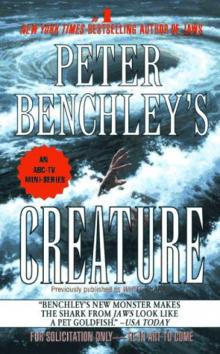 Peter Benchley's Creature
Peter Benchley's Creature The Island
The Island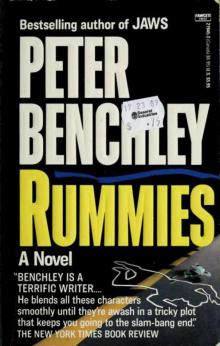 Rummies
Rummies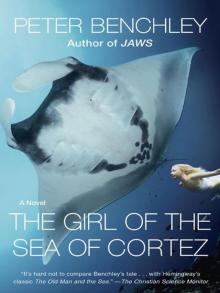 The Girl of the Sea of Cortez: A Novel
The Girl of the Sea of Cortez: A Novel Time and a Ticket
Time and a Ticket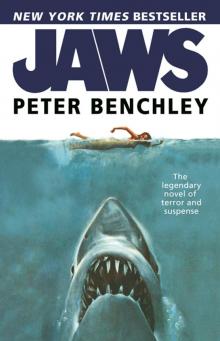 Jaws
Jaws The Deep
The Deep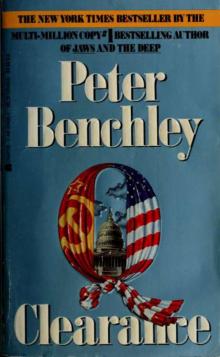 Q Clearance
Q Clearance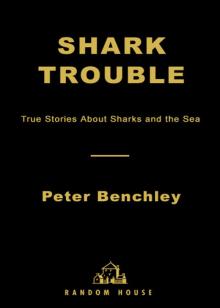 Shark Trouble: True Stories and Lessons About the Sea
Shark Trouble: True Stories and Lessons About the Sea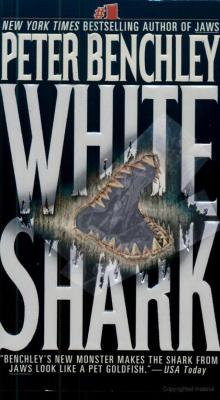 White Shark
White Shark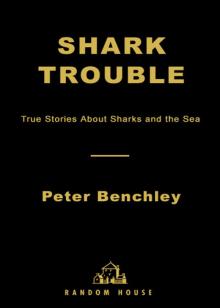 Shark Trouble
Shark Trouble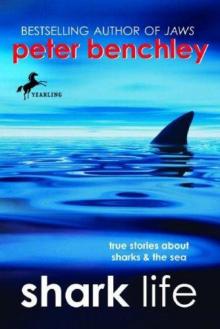 Shark Life: True Stories About Sharks & the Sea
Shark Life: True Stories About Sharks & the Sea